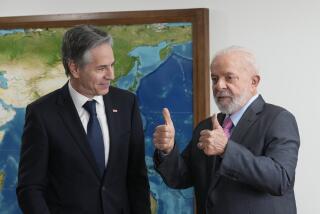IMF Approves $2.1-Billion Loan to Brazil as Key to Reforms : Economy: Deal is crucial to give Third World’s biggest debtor a breathing spell. New policies win praise.
- Share via
WASHINGTON — The International Monetary Fund approved a $2.1-billion loan for Brazil on Wednesday, a key requirement for the Third World’s biggest borrower to get its debt burden in line.
Experts see the agreement as a landmark for Brazil, which owes $118 billion to foreign banks, governments and international agencies.
The IMF praised Brazil’s plans to reform and liberalize its economy and to rein in inflation of 25% per month through higher interest rates and a tighter budget policy.
“This marks a major departure from previous efforts in recent years to curb inflation,” the IMF said.
It said that 25% of the $2.1-billion loan will be set aside to support Brazil’s efforts to negotiate a reduction in its commercial bank debt.
Approval of the long-sought loan paves the way for serious talks with commercial banks and creditor nations from which Brazil is seeking a reduction and easier terms on the money it owes.
A program with the IMF should help debt negotiator Pedro Malan, who is in New York seeking better treatment for Brazil’s $49-billion commercial debt.
It should also give ammunition to Economy Minister Marcilio Marques Moreira, who on Thursday plans to embark on a five-European nation tour for talks with Paris Club creditor nations that hold $22 billion in Brazilian debt.
Brazil, whose foreign debt is the developing world’s largest, has sought the standby loan for nearly two years now.
A deal was considered crucial by the financial community.
The loan opens the door to further lending to the financially strapped country. The World Bank, for example, has said it will make $1 billion available later this year if Brazil got the IMF loan first.
Also, an IMF program commits the country to tight austerity, privatization and economic liberalization policies, seen as critical to Collor’s economic plan.
The loan suffered its latest delay last week, when the IMF postponed a vote after a Brazilian judge ordered a 147% hike for retired people, which the government claimed could cost up to $10 billion a year.
But Collor issued a decree deferring the increase until 1993 which appeared to defuse the crisis, even in the eyes of usually cautious markets. The value of Brazilian debt certificates jumped nearly 5 points on expectations that the deal would go through this time.
Economists say the Group of Seven Western industrial nations had some doubts about Brazil’s plan, particularly due to its failure to control inflation, which has been running at 25% a month since November.
And they point out domestic support for more austerity measures is unlikely after several past attempts to stem inflation with drastic price and wage freezes caused much suffering and brought little results.
More to Read
Sign up for Essential California
The most important California stories and recommendations in your inbox every morning.
You may occasionally receive promotional content from the Los Angeles Times.













